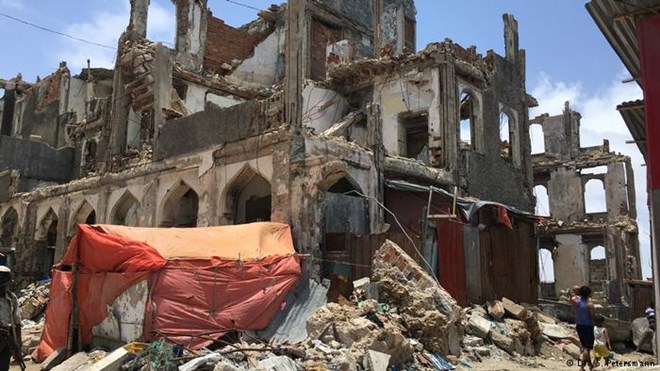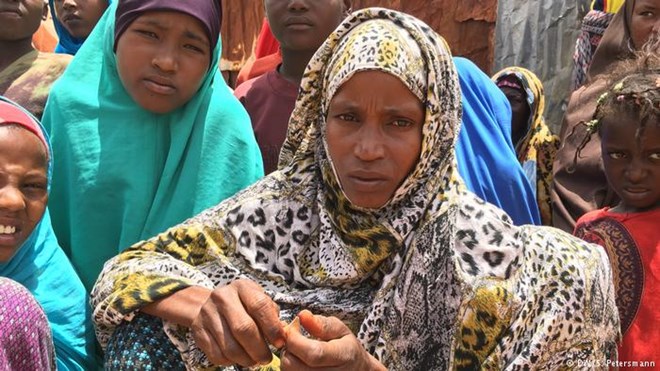
Thursday September 28, 2017

Under the Trump administration, the US has significantly amped up military engagement in Somalia. Special forces are fighting alongside Somali soldiers to defeat terror organization al-Shabab. Sandra Petersmann reports.
Foreign soldiers, gunshots, explosions, air strikes - when refugees from Bariire talk about what they've experienced, they are unable to name exact dates. Days and events blur together as emotions run high.
They are afraid - of both sides, they say. Marian is now a widow and mother to seven children who have lost their father. When fighting in Bariire stopped, Marian found her husband's body - bloody and riddled with bullets - dumped on a field. She can't say who shot him or when he was killed.
Marian and others who fled the fighting are now sitting on the dusty streets of a refugee camp in Somalia's capital Mogadishu. The farmers fled their homes in Bariire, a town in the embattled region of Lower Shabelle in Somalia's south, some 60 kilometers (37 miles) from Mogadishu.
Not long ago, Bariire was considered a stronghold of the Islamist al-Shabab militia that's joined al-Qaeda in the fight for a caliphate.
But on August 20, African Union (AU) troops and Somali soldiers managed to retake Bariire's city center. The AU has deployed some 22,000 soldiers in Somalia to fight against al-Shabab. Unconfirmed eyewitness reports say US soldiers also helped recapture the city.
What happened in Bariire?
The Somalian government initially denied civilians had been killed, but later corrected this statement. Relatives took the dead bodies all the way to Mogadishu in protest. Army chief General Ahmed Mohamed Jimale Irfid said they initially mistook the killed farmers for al-Shabab fighters due to it being dark in the early morning hours.
The US Africa Command based in Stuttgart, Germany, immediately issued a response on August 25.
"We are aware of the civilian casualty allegations near Bariire, Somalia. We take any allegations of civilian casualties seriously, and per standard, we are conducting an assessment into the situation to determine the facts on the ground," the statement read.
"We can confirm that the Somali National Army was conducting an operation in the area with US forces in a supporting role."
Since then, no other details have been shared with the public. According to Somalian media reports, the clan of the killed farmers has received compensation payments.
Rebuilding a failed state
Somalia has been riven by war since 1991. The state disintegrated, with the country's most powerful clans filling the void.
The country on the Horn of Africa now wants to build new federal structures with international help.
Since December of last year, there is a new parliament; since February of this year the country has a new president.
In both rounds of voting, the big Somalian clans were also vying for power - a lot of cash was handed out.
Still, the result can be considered a massive improvement, according to Michael Keating, Special Representative of the UN Secretary General for Somalia.
Marred by corruption and intimidation, but still legitimate
"It was an electoral process which was also marked by corrupt practices and intimidation. But the amazing thing is that the result was received as legitimate both by both the Somali population as well as the international community", Keating told DW.
Especially President Mohamed Abdullahi Mohamed, who holds both Somalian and US citizenship, enjoys people's trust. He is a refugee himself who returned to the country and now lobbies for additional military support, investment and direct financial aid for his government. Right off the Somalian coast are oil reserves waiting to be tapped.
"The peace and stability in Mogadishu and Somalia is the peace and stability for the whole world. Somalia is a test case where we can show to the world that you can defeat terrorism", Information Minister Abdirahman Omar Osman told DW. He moved back to Somalia from London.

These days, many people from the Somalian diaspora are daring to return to their home country.
This spirit of optimism is palpable in the Somalian capital - countless construction sites and new streets, cafés and shops attest to that. Foreign diplomats, advisers and volunteers are pouring into the country. New embassies are being built.
But most foreigners still barricade themselves behind high protective walls that have been put up around the airport. Car bombs, suicide attackers and abductions are still part of Somalian daily life.
"The challenge is: how do we work together to help the Somalis sort out their own problems on their own terms and not try and impose our own solutions because we are in a hurry, or because we need certain things done," said Keating. "You have to be very respectful of Somali culture and politics."
Lessons learnt from Bariire?
But the unresolved case of the ten civilians who were killed in Bariire shows just how complicated the process of building a nation truly is. The region of Lower Shabelle isn't just a stronghold of al-Shabab, but also home to rival clans with access to weapons. The drought at the Horn of Africa has exacerbated conflicts over water and land. It's hard to distinguish between civilians and extremists.
Who was the source of information that led to military operations in the early morning hours in Bariire on August 25? Who checked the information? The US has only "a few dozen soldiers" in the country, according to their own account - that means they rely on Somalian sources for military reconnaissance.
Security sources say it's possible that one clan accused the other of fighting for al-Shabab. Chances are US forces, alongside Somali soldiers, have been dragged into a local conflict in Bariire.
Al-Shabab exploits fears
In March, US President Donald Trump gave the US military more power to carry out anti-terror operations in Somalia. Since then, there have been at least 13 missions with US participation - three ground strikes and 10 airstrikes.
According to Keating, military pressure needs to be exerted. But "global experience suggests you can't defeat an insurgency purely by military means," he said, adding that justice and creating opportunities were just as important. Somalia, he said, was full of unresolved conflicts.
A former al-Shabab member from Lower Shabelle, who has since left the group, told DW the extremists were exploiting local conflicts to attack the state. "The people here don't trust the government," he said. "In the areas controlled by al-Shabab, people fear the military will loot and rape - and al-Shabab has become skilled at tapping into those fears."
Military operations such as the one in Bariire could help drive new recruits into the arms of al-Shabab.